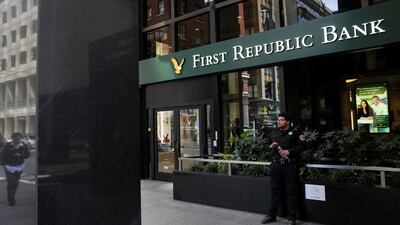US regulators were working into the night on Sunday to resolve the First Republic Bank crisis after a midday deadline passed for the submission of final bids to take over the struggling lender.
The Federal Deposit Insurance Corporation had asked banks including JP Morgan Chase, PNC Financial Services Group and Citizens Financial Group to submit offers, according to sources.
Bank of America and US Bancorp were also invited but decided against bidding, according to the sources.
Regulators have been asking follow-up questions to at least some of the bidders as they compare the banks’ proposals. If no agreement is reached, regulators would have the option of seizing First Republic and taking ownership of the bank.
The representatives of JP Morgan, PNC, Citizens Financial, US Bancorp, Bank of America and the FDIC declined to comment.
The bidding process started by regulators — after weeks of fruitless talks among banks and their advisers — could pave the way for a tidier sale of First Republic than the drawn-out auctions that followed the failures of Silicon Valley Bank and Signature Bank last month.
Authorities are stepping in after a particularly precipitous drop in the company’s stock over the past week, which is now down 97 per cent this year.
Unclear to some involved in the process is whether regulators might use a bid for an “open-bank solution” that avoids formally declaring First Republic a failure and seizing it.
The stock’s drop — leaving the company with a market value of $650 million — has made such a takeover at least somewhat more feasible.
Jumbo mortgages
But finances are not the only hurdle to doing a deal.
JP Morgan is among a small number of big banks that have already amassed more than 10 per cent of nationwide deposits, making the lender ineligible under US regulations to acquire another deposit-taking institution.
Authorities would have to make an exception to allow the country’s largest bank to become even bigger.
As of Friday evening, the FDIC had yet to reach a decision on putting First Republic into receivership, sources said.
Representatives for California’s banking regulator, which would take the lead in declaring whether the San Francisco-based lender has failed, did not respond to requests for comment.
Weighing on First Republic’s balance sheet is a mountain of low-interest loans, including an unusually large portfolio of jumbo mortgages to wealthy clients.
Such debts have lost value amid interest-rate increases, leaving the lender facing losses if forced to sell them.
During last month’s regional banking crisis, wealthy customers and businesses yanked their cash from banks with such flaws in their balance sheets.
In response, the Federal Reserve opened up an emergency lending facility to give banks a way to borrow against some of their holdings to meet any demands for cash.
Waiting for aid
A group of 11 banks that deposited $30 billion into First Republic in March — giving it time to find a private sector solution — have proved reluctant to band together on making a joint investment.
A few proposals that surfaced in recent days called for a consortium of stronger banks to buy assets from First Republic for more than their market value. But no agreement materialised.
Instead, some stronger lenders have been waiting for the government to offer aid or put the bank in receivership, a resolution they view as cleaner — and potentially ending with a sale of the bank or its pieces at attractive prices.
But receivership is an outcome the FDIC would prefer to avoid, in part because of the prospect that it will inflict a multibillion-dollar hit to its own deposit insurance fund.
The agency is already planning to impose a special assessment on the industry to cover the cost of SVB and Signature Bank’s failures last month.

